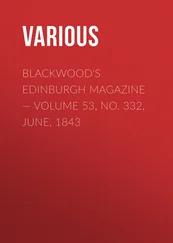Various - Blackwood's Edinburgh Magazine, Volume 59, No. 368, June 1846
Здесь есть возможность читать онлайн «Various - Blackwood's Edinburgh Magazine, Volume 59, No. 368, June 1846» — ознакомительный отрывок электронной книги совершенно бесплатно, а после прочтения отрывка купить полную версию. В некоторых случаях можно слушать аудио, скачать через торрент в формате fb2 и присутствует краткое содержание. Издательство: Иностранный паблик, Жанр: periodic, foreign_edu, Путешествия и география, на английском языке. Описание произведения, (предисловие) а так же отзывы посетителей доступны на портале библиотеки ЛибКат.
- Название:Blackwood's Edinburgh Magazine, Volume 59, No. 368, June 1846
- Автор:
- Издательство:Иностранный паблик
- Жанр:
- Год:неизвестен
- ISBN:нет данных
- Рейтинг книги:5 / 5. Голосов: 1
-
Избранное:Добавить в избранное
- Отзывы:
-
Ваша оценка:
- 100
- 1
- 2
- 3
- 4
- 5
Blackwood's Edinburgh Magazine, Volume 59, No. 368, June 1846: краткое содержание, описание и аннотация
Предлагаем к чтению аннотацию, описание, краткое содержание или предисловие (зависит от того, что написал сам автор книги «Blackwood's Edinburgh Magazine, Volume 59, No. 368, June 1846»). Если вы не нашли необходимую информацию о книге — напишите в комментариях, мы постараемся отыскать её.
Blackwood's Edinburgh Magazine, Volume 59, No. 368, June 1846 — читать онлайн ознакомительный отрывок
Ниже представлен текст книги, разбитый по страницам. Система сохранения места последней прочитанной страницы, позволяет с удобством читать онлайн бесплатно книгу «Blackwood's Edinburgh Magazine, Volume 59, No. 368, June 1846», без необходимости каждый раз заново искать на чём Вы остановились. Поставьте закладку, и сможете в любой момент перейти на страницу, на которой закончили чтение.
Интервал:
Закладка:
Antoine Laurent Lavoisier was born in Paris in 1743, the son of one of the "farmers-general." As the office was nearly hereditary, and was proverbially connected with great opulence, the son of the rich functionary was highly educated. But science soon attracted all his study, and, devoting himself especially to chemistry, he made himself conspicuous among the leading philosophers of his time.
At the age of twenty-two, he presented to the Academy of Sciences an analysis of gypsum. At twenty-five he was admitted a member of the Academy, an unusually early age. In his next year he succeeded his father in his lucrative office. He then married the daughter of another farmer-general, and having made this provision for a life of luxury or public employment, with all that political ambition might offer in the old régime of France, he collected his books about him, shut himself up in his study, and gave up his time, fortune, and energy to the advancement of science.
After occupying himself for a brief period with geology, he commenced his chemical career by refuting the theories alike of Margraff and Stahl on the conversion of water into earth. The chemistry of the gases had made rapid progress in England; and the names of Black, Priestley, and Cavendish, had already attracted the attention of scientific Europe. Lavoisier followed in their track by a series of experiments in the calcination of metals, pursued with remarkable intelligence and industry. The biographer observes that he was now on the verge of two dazzling discoveries – the composition of the atmosphere, and the identity of the diamond with carbon. But he stopped short, and left the glory to more fortunate investigators.
We hasten from the controversies to which the claim of priority in those distinguished discoveries gave rise, and come to the more authentic services of Lavoisier. He was appointed by the minister to superintend the royal manufacture of gunpowder, which his chemical knowledge enabled him greatly to improve. He next, by appointment of the National Assembly, drew up his laborious and valuable memoir on the Territorial Wealth of France . He was now appointed one of the commissioners of the treasury, and introduced an unexampled regularity into the public accounts. He aided the formation of the metrical system, the security of the assignats against forgery, and seems to have borne an active part in every public matter in which practical science was concerned. In the mean time he employed himself in scientific agriculture, and set apart a tract of land on his estate for experimental farming. His style of living in Paris was at once rational and splendid. His house was open twice a-week for the reception of distinguished persons, both foreigners and natives, and especially if they brought with them the recommendation of scientific ability. With the finest philosophical apparatus in the possession of any individual in France, he was constantly carrying on experiments on his own account, or performing them for others whose means could not meet their expense. This conduct, united to remarkable amiability of manners, made him popular, and placed him at the head of French science in his day. But the evil time had come when opulence was to be a crime, and virtue was to be no longer a safe-guard. The democratic triumvirate of 1794 issued an order for the seizure of twenty-seven individuals who had been farmers-general before the Revolution. The true charge was the crime of being opulent. The popular and ridiculous charge was, their having mixed deleterious ingredients with the tobacco. Lavoisier having received information that the order was about to be executed, fled, and remained for some days in concealment. On understanding that his flight might injure the other prisoners, and as his father-in-law was among them, he, with a rash reliance on the public justice, yet with manly generosity, returned to Paris, and gave himself up to his oppressors. The course of the Revolution had been so palpably that of general plunder, that he had long expected the loss of fortune, and proposed, in case of ruin, to begin the world again, and live by the profession of medicine.
But, by a furious act of violence, he was condemned to die. He asked only a few days to complete some experiments which were going on during his imprisonment. The scoffing answer of this merciless tribunal was, that the Republic had no need of philosophers; and on the day after this sentence, the 8th of May 1794, he was hurried to the guillotine with no less than one hundred and twenty-three other victims, who all died within a few hours.
On this melancholy and desperate atrocity of republicanism, Lord Brougham makes the following remark, which, though natural in the lips of any human being, has double force as coming from one who has seen the operation of the revolutionary spirit on so large a scale, and during so extended a portion of his public career.
"The lustre," he observes, "which the labours of Lavoisier had shed over the scientific renown of France, the valuable services which he had rendered her in so many important departments of her affairs, the virtues which adorned his character and made his philosophy beloved as well as revered, were all destined to meet the reward with which the tyranny of vulgar faction is sure to recompense the good and the wise, as often as the base unlettered multitude are permitted to bear sway, and to place in the seat of dominion their idols, who dupe to betray , and finally punish them."
Lord Brougham justly reprobates the suspicious silence of the celebrated Carnot on this occasion, and the still more scandalous apathy of Fourcroix, who had been the pupil and panegyrist of the great chemist during many years. He acquits him of the deadly imputation, that he had even been instrumental in sending his master to the guillotine. But he praises, in contradistinction, M. Hallé, who had the honest courage to proclaim Lavoisier's public services before the dreadful tribunal, while he consigns the pupil to perpetual scorn. He was murdered in his fifty-first year.
Lord Brougham's French predilections do credit to his sense of cosmopolitism; but he appears to us somewhat more disposed to conciliate the jealousy of his very irritable French confrères , than to deal rigorous justice. No man deserves the reputation of science but a discoverer. To know all that has been hitherto known on a subject, deserves the character of diligence; to promote the progress of a science by largeness of expenditure, or steadiness of exertion, deserves the praise of liberality and labour; but the man who adds to the science by original invention, who enlarges its boundaries, and detects new principles, is the man alone to whom the name of genius can be applied. Lavoisier was, unquestionably, an important minister of science; he possessed singular assiduity, unwearied zeal, and remarkable sagacity. What these could do, he did; what knowledge could accomplish, he performed; but the inventors were of another country, and of a higher order, and he must be content with the honours due to imitation. Yet he had considerable happiness in the difficult art of communicating his knowledge. His Treatise on Chemistry , though now superseded by subsequent arrangements, is singularly clear; and no great teacher of chemistry has hitherto given the world a more striking example of exactness in detail, and clearness in conception.
His cruel death, too, may be almost said to have continued his services to society. It proved, with irresistible force, the true character of Infidel Revolution. It showed a noble-minded and benevolent man the victim of revolutionary rage; an intelligent, studious, and retired man, obnoxious to the rabble love of ruin; a mild, generous, and patriotic man, the instant prey of revolutionary government, which boasted of its superiority to the vices of kings, of its homage to intellect, and of its supreme value for the virtues of private life. Yet it murdered Lavoisier without a moment's hesitation, or a moment's remorse, and flung the first philosopher of France into a felon's grave.
Читать дальшеИнтервал:
Закладка:
Похожие книги на «Blackwood's Edinburgh Magazine, Volume 59, No. 368, June 1846»
Представляем Вашему вниманию похожие книги на «Blackwood's Edinburgh Magazine, Volume 59, No. 368, June 1846» списком для выбора. Мы отобрали схожую по названию и смыслу литературу в надежде предоставить читателям больше вариантов отыскать новые, интересные, ещё непрочитанные произведения.
Обсуждение, отзывы о книге «Blackwood's Edinburgh Magazine, Volume 59, No. 368, June 1846» и просто собственные мнения читателей. Оставьте ваши комментарии, напишите, что Вы думаете о произведении, его смысле или главных героях. Укажите что конкретно понравилось, а что нет, и почему Вы так считаете.












